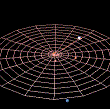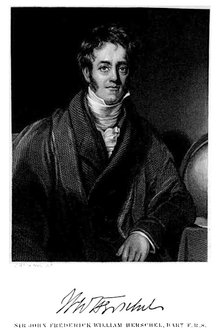|
William Herschel discovered the first planet since ancient antiquity in 1781. He desired to name the planet after King George III, though others wanted to give it his name, as Thomas Jefferson wrote from Paris to John Page, August 20, 1785:
“You will find in these the tables for the planet Herschel, as far as the observations hitherto made… You will see…that Herschel was…the first astronomer who discovered it to be a planet.”
Born in Germany, November 15, 1738, William Herschel was a musician like his father, who was bandmaster in the Hanoverian guard.
A contemporary of Mozart, William Herschel fled to England during the Seven Years War.
William Herschel was hired as the first organist at St John the Baptist Church in Halifax, and then organist at the prestigious Octagon Chapel in Bath, eventually writing 24 symphonies.
William Herschel pursued astronomy on the side, building his own telescope to observe, not just the solar system, but “the construction of the heavens.” He taught himself how to grind and polish telescopic mirrors, becoming pre-eminent in that field.
William Herschel constructed over 400 telescopes, including the largest reflecting telescopes of his day, using them to catalog over 90,000 new stars, as well as nebulae and galaxies.
After discovering Uranus, the 7th planet from the sun, King George III granted William Herschel a permanent salary as a royal astronomer.
William Herschel identified double-stars, coined the word “asteroid,” meaning star-like, and discovered infrared radiation.
The Scientific Papers of Sir William Herschel (published by the Royal Society in 1912), recorded his diary entry of an argument over naturalistic philosophy: “The First Consul…asked in a tone of exclamation…when we were speaking of the extent of the sidereal heavens ‘and who is the author of all this’… LaPlace wished to shew that a chain of natural causes would account for the construction… This the First Consul rather opposed. Much may be said on the subject; by joining the arguments of both we shall be led to ‘Nature and Nature’s God.'”
The Royal Society editor wrote in a footnote of Herschel’s missing letters: “Some 400 pages…are still extant… We are informed that Herschel in them interweaves his philosophy and even his musical studies with references of an earnest kind to the Creator as a beneficent Deity, expressing his gratitude and addressing him in a prayerful spirit.”
William Herschel was made a Knight of the Royal Guelphic Order by Prince Regent, George IV, in 1816. Sir William Herschel died in his observatory, AUGUST 25, 1822.
He was buried in St. Laurence Anglican Church in Slough, England, where a stained-glass ‘Herschel Window‘ commemorates his astronomical discoveries and another window quotes Psalm 8:
“When I consider the heavens, the work of Thy fingers, the moon and the stars, which Thou hast ordained, what is man, that Thou art mindful of him?”
A contemporary of Sir William Herschel was the famous English poet, Edward Young (1681-1765), whose poem “Night Thoughts” was published in 1742 and became so popular it was translated into French, German, Italian, Spanish, Portuguese, Swedish and Magyar, and quoted throughout Europe and America.
Line 771 of Edward Young’s poem “Night Thoughts,” possibly referred to by Sir William Herschel, was: “By mortal ear, the glorious Architect, Get the book America’s God and Country Encyclopedia of Quotations William Herschel’s sister, Caroline, assisted him and also discovered 6 comets herself, for which she was honored by royalty.
William Herschel’s son, Sir John Frederick Herschel, took his father’s telescope to South Africa where he cataloged hundreds of new stars and nebulae seen from the southern hemisphere. When the HMS Beagle landed at Cape Town, South Africa, on June 3, 1836, the young Charles Darwin visited Sir John Frederick Herschel.
Sir John Frederick Herschel was quoted by Marcel de Serres in ‘On the Physical Facts in the Bible Compared with the Discoveries of the Modern Sciences’ (The Edinburgh New Philosophical Journal, 1845, Vol. 38, 260): “All human discoveries seem to be made only for the purpose of confirming more strongly the truths come from on high, and contained in the Sacred Writings.” For God’s Glory Alone Ministries thanks Bill Federer and www.AmericanMinute.com
|
Home The World We Live In The American Minute: Astronomer William Herschel – “An undevout astronomer is mad.”
























